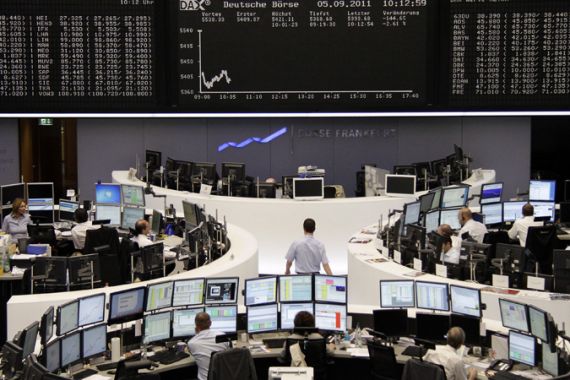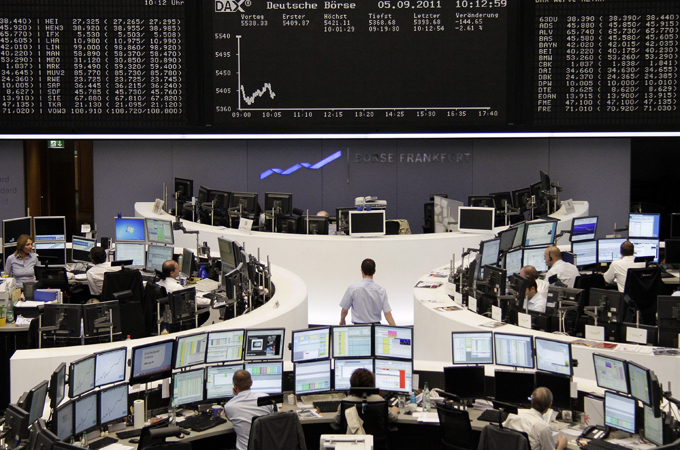European shares slip on US recession fears
Banking stocks among worst performers as political and legal tests threaten Europe’s efforts to resolve debt crisis.

 |
| Markets across Europe extended losses in wake of last week’s weak US non-farm payroll data [Reuters] |
European shares have fallen, extending their previous session slide on concerns that the United States could be heading towards recession following last week’s weaker-than-expected US non-farm payroll data.
Banking stocks on Monday featured heavily among the worst performers on the growth outlook concerns, with the STOXX Europe 600 Banks index down 2.6 per cent.
Keep reading
list of 4 itemsWhy is Germany maintaining economic ties with China?
Behind India’s Manipur conflict: A tale of drugs, armed groups and politics
China’s economy beats expectations, growing 5.3 percent in first quarter
“Sentiment seems to be playing a big move in these market swings, nothing happened over the weekend to install investor confidence,” Mark Priest, senior equities trader at ETX Capital, said.
“There are concerns that growth is not what it is expected to be.”
At closing time, London’s FTSE 100 index of leading companies dropped 3.58 per cent to 5,102.58 points.
In Paris, the CAC 40 fell 4.73 per cent to 2,999.54 points and in Frankfurt the DAX plunged 5.28 per cent to a two-year low at 5,246.18 points.
Mid-way through Latin American trading on Monday,the mani regional index fell 3.22 per cent and Mexico’s stocks fell 2.11 per cent following the European day’s losses.
Europe growth forecast
Speaking in the Australian capital, Canberra, Jose Manuel Barroso, the European Commission chief, said he did not expect Europe to slide into recession and that the EU and the euro were “strong and resilient”.
“We don’t anticipate a recession in Europe. The latest forecast by the European Commission shows there will be growth, modest growth it is true,” Barroso told a joint news conference with Julia Gillard, the Australian prime minister, on Monday.
As Barroso made his comments, Jean-Claude Trichet, the head of the European Central Bank (ECB), called for urgent application of the latest debt rescue measures for Greece.
Trichet also spoke of an “absolutely imperative” need to tighten up the monitoring of economies in the eurozone.
Europe continues to grapple with a string of political and legal tests that could hurt efforts to resolve its sovereign debt crisis and increase pressure for governments to try more radical solutions.
A court ruling may reduce the freedom of the German government, the biggest contributor to the euro zone’s bailout fund, to finance rescues of crisis-hit countries such as Greece.
The ECB, internally split over its bond market intervention to protect Italy, is expected to review the programme.
And Greece will find out how successful it has been in persuading private investors to take part in a bond swap designed to cut its 340bn euro debt mountain.
None of these challenges looks likely to doom policymakers’ frantic attempts to keep indebted euro zone countries afloat while they try to regain the confidence of financial markets.
But this week’s events may underline how vulnerable those attempts are to worsening political currents in the euro zone, and how far the 17-nation bloc remains from finding a lasting solution to the debt crisis.
German ruling awaited
On Wednesday morning, Germany’s Federal Constitutional Court will deliver its ruling – awaited for over a year – on suits claiming Berlin is breaking German law and European treaties by contributing to multi-billion euro bailouts of Greece, Ireland and Portugal.
Legal experts think the court is highly unlikely to block the contributions altogether. But it is expected to give the German parliament a bigger say in approving them.
With German public opinion turning against providing more aid to Europe – a survey published last week suggested two-thirds of Germans think parliament should not ratify more money for the bailout fund – that could be a dangerous concession.
At the very least, it might further slow and complicate Berlin’s responses to the debt crisis.